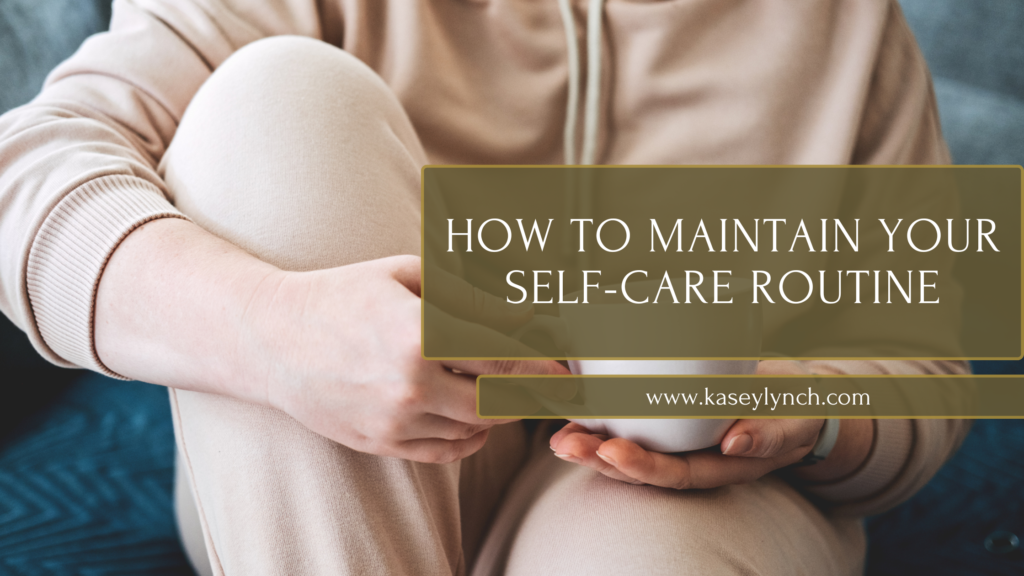Last Updated on 5 months ago by Kasey Lynch

In the hustle of daily life, it’s easy to let self-care slip through the cracks. But maintaining a consistent self-care routine is essential for your mental, physical, and emotional well-being — especially if you’re a woman.
Whether you’re juggling work, family, or personal projects, prioritizing self-care can help you feel more balanced, energized, and prepared to show up for yourself and your life in ways that make you feel empowered.
It can be all too easy to put your needs on the back burner, whether you have kids, a husband, a sick family member, a new dog, the list goes on. But by firmly committing to putting your needs and self-care at the forefront of your daily schedule, you’ll be amazed by how a little bit of effort goes a really long way.
Here are some practical tips to help you stay committed to your self-care routines.
10 Ways to Prioritize Self-Care
1. Schedule Self-Care Like an Appointment
Treat self-care as a non-negotiable part of your day. Block out time on your calendar just like you would for a meeting or an important task. Setting a reminder can help ensure you follow through, whether it’s for a morning meditation, a workout, or an evening skincare ritual.
When self-care becomes a scheduled activity rather than an afterthought, you’re more likely to stay consistent. Consider creating a weekly self-care plan where you list specific activities and stick to them as closely as possible.
2. Start Small and Build Consistency
If you’re struggling to maintain self-care routines, start with small, manageable habits. A five-minute mindfulness session, a short walk, or drinking more water throughout the day can create a foundation for bigger changes over time.
The key is to make self-care a habit by integrating it into your daily life in ways that don’t feel overwhelming. As you build momentum, you can gradually increase the duration and depth of your self-care activities, such as extending meditation sessions or incorporating more elaborate skincare or exercise routines.
Pro tip: Use habit stacking to make the most of your self-care routine. For example, listen to your favorite podcast when you’re walking the dog or make your favorite cup of coffee to enjoy while you’re doing your skincare in the morning.
3. Identify What Feels Good for You
Self-care looks different for everyone. Some people find peace in yoga, while others recharge with a creative hobby or outdoor adventure. Experiment with different activities to discover what truly helps you unwind and feel refreshed.
Pay attention to how you feel after each activity — do you feel more relaxed, energized, or fulfilled? I call this approach habit auditing. Your self-care routine should be something you look forward to rather than an obligation.
Keep a list of go-to self-care activities so you can choose based on your mood and needs.
4. Set Realistic Expectations
Life gets busy, and some days will be harder than others. Instead of aiming for perfection, focus on progress. If you miss a workout or forget to journal one night, don’t be too hard on yourself — just pick back up the next day.
Recognize that self-care is a journey, not a destination.
Adjust your expectations to accommodate your lifestyle, and remember that even small acts of self-care, like pausing for deep breaths or stretching, can make a difference. The goal is consistency, not perfection.
5. Create a Relaxing Environment
Your surroundings can influence your ability to maintain self-care routines. Set up a calming space with soothing scents, cozy lighting, and minimal distractions to encourage relaxation and mindfulness.
A dedicated space for self-care — such as a meditation corner, a clutter-free bedroom, or a cozy reading nook — can help signal to your brain that it’s time to unwind.
If possible, incorporate elements that engage your senses, such as calming music, aromatherapy, or soft textures, to enhance the relaxation experience.
For me, this looks like lighting a candle after cleaning the kitchen after dinner. I always look forward to lighting that candle, sitting on the couch, and watching an episode of whatever show I’m into at the time.
Related: Ditch the Device: 100 Screen-Free Activities
6. Incorporate Self-Care into Everyday Activities
Not all self-care requires extra time. You can integrate it into your daily life by listening to uplifting podcasts while commuting, practicing deep breathing while cooking, or stretching before bed. Finding small pockets of time throughout your day to practice self-care can make a big difference in your overall well-being.
Even mundane activities like showering or making your morning coffee can become self-care rituals if done mindfully. The key is to be intentional — recognize and appreciate these moments rather than rushing through them.
7. Hold Yourself Accountable
Accountability can help reinforce your self-care habits. Share your goals with a friend, join a community, or track your progress in a journal or app to stay motivated. Having someone check in with you can make a big difference in staying committed to your routine.
If you prefer a more structured approach, consider setting specific self-care goals and tracking them daily or weekly. Seeing your progress over time can provide a sense of accomplishment and motivate you to keep going.
Another way to enjoy accountability without relying on others to remind you is by sharing your journey on social media! If you highlight what you’re trying to achieve and have to post on your story every time you’ve completed it — this acts as an accountability reminder while also putting yourself in a position to inspire others to prioritize self-care as well.
8. Adjust as Needed
Your needs will change over time, and so should your self-care routine. Be flexible and adjust your practices to align with your current lifestyle and energy levels. What works during one phase of life may not be as effective in another.
Regularly reassess your self-care habits and make modifications as needed. For example, if a high-intensity workout routine becomes too draining, switch to a gentler practice like yoga or walking. Staying adaptable ensures that your self-care remains effective and sustainable.
9. Prioritize Rest and Sleep
Quality rest is one of the most fundamental forms of self-care. Create a bedtime routine that helps you unwind, such as turning off screens an hour before bed, reading, or practicing meditation.
Poor sleep can affect your mood, productivity, and overall health, so making rest a priority is crucial. Set a consistent bedtime, create a comfortable sleep environment, and avoid stimulants like caffeine or screen time before bed.
If necessary, incorporate relaxation techniques such as progressive muscle relaxation or guided sleep meditations to improve your sleep quality.
10. Celebrate Your Efforts
Acknowledge the steps you’re taking toward better self-care. Celebrate small victories, whether it’s sticking to a morning routine for a week or making time for yourself despite a busy schedule. Recognizing your progress will encourage you to keep going.
Give yourself credit for the effort you put in, even if the results aren’t immediate.
Consider rewarding yourself with something enjoyable, like a spa day, a favorite meal, or a quiet afternoon doing something you love. Positive reinforcement can help solidify self-care as a long-term habit.
Put Yourself First. You’re Worth It.
By implementing these tips, you’ll cultivate a self-care routine that supports your overall well-being. Remember, self-care isn’t selfish—it’s necessary. Prioritize yourself, and you’ll find that you have more energy and joy to share with the world.





Leave a Reply